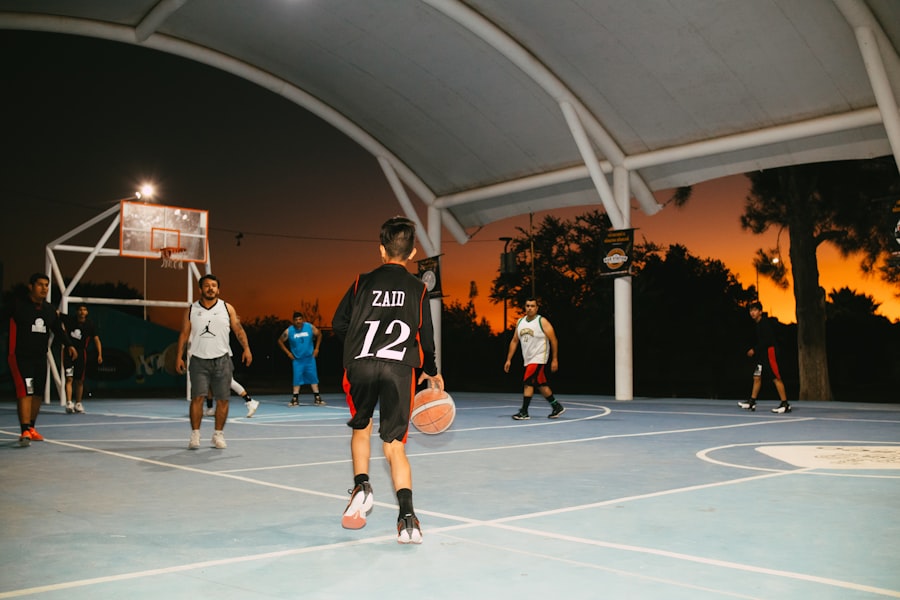The role of a FIBA basketball agent is multifaceted, encompassing a wide range of responsibilities that extend beyond mere contract negotiation. At its core, a FIBA agent serves as an intermediary between professional basketball players and teams, ensuring that the interests of the player are represented and protected. This involves not only securing contracts but also navigating the complex landscape of international basketball, which includes understanding various leagues, regulations, and cultural nuances.
A successful agent must possess a deep knowledge of the sport, as well as the ability to build relationships with coaches, team executives, and other stakeholders in the basketball community. Moreover, FIBA agents are tasked with promoting their clients’ careers on a global scale. This requires an understanding of the unique dynamics of different basketball markets, from Europe to Asia and beyond.
Agents must stay informed about trends in player performance, team needs, and market demands to effectively position their clients for success. This often involves scouting potential opportunities in various leagues and identifying the best fit for each player’s skills and aspirations. The agent’s role is not just about finding a job; it’s about crafting a career path that aligns with the player’s long-term goals.
Key Takeaways
- A FIBA basketball agent plays a crucial role in managing players’ careers and opportunities internationally.
- Navigating the global basketball market requires knowledge of diverse leagues, regulations, and cultural nuances.
- Building strong, trust-based relationships with players is essential for long-term success.
- Effective negotiation skills are key to securing favorable contracts and endorsement deals.
- Supporting players’ development, well-being, and legal/financial matters ensures a holistic approach to their careers.
Navigating the International Basketball Landscape
The international basketball landscape is characterized by its diversity and complexity. With leagues operating under different rules and regulations, agents must be adept at navigating these variations to secure the best opportunities for their clients. For instance, European leagues often have different salary structures, roster limits, and player eligibility requirements compared to those in the United States.
An agent must be well-versed in these differences to effectively advise players on where they might thrive. This includes understanding the nuances of FIBA regulations, which govern international play and player transfers. Additionally, cultural factors play a significant role in how basketball is perceived and played in different regions.
An agent must be sensitive to these cultural differences when negotiating contracts or discussing potential opportunities with teams. For example, a player moving from the NBA to a European league may face challenges related to language barriers or differing expectations regarding work ethic and professionalism. A knowledgeable agent can help bridge these gaps by providing guidance on local customs and practices, ensuring that players can adapt quickly and effectively to their new environments.
Building and Managing Player Relationships

Building strong relationships with players is essential for any FIBA basketball agent. Trust is a cornerstone of this relationship; players need to feel confident that their agent has their best interests at heart. This trust is cultivated through open communication, transparency, and a genuine understanding of the player’s aspirations both on and off the court.
An effective agent takes the time to get to know their clients personally, understanding their motivations, fears, and long-term goals. This personal connection allows agents to tailor their approach to each player’s unique situation. Managing these relationships also involves being available and responsive.
Players often face pressures from various sources—coaches, fans, media—and having an agent who can provide support during challenging times is invaluable. An agent must be proactive in addressing any concerns that arise, whether they relate to contract negotiations or personal issues. By being a reliable source of guidance and support, agents can foster loyalty and ensure that players feel secure in their professional journey.
Negotiating Contracts and Endorsement Deals
| Metric | Description | Typical Range | Importance |
|---|---|---|---|
| Contract Length | Duration of the contract in years | 1 – 5 years | High |
| Compensation Structure | Fixed fee, performance bonuses, royalties, or combination | Varies by deal | High |
| Exclusivity Clause | Whether the endorser can work with competing brands | Exclusive or Non-exclusive | Medium to High |
| Performance Metrics | Sales targets, social media engagement, or other KPIs | Defined per contract | Medium |
| Termination Conditions | Conditions under which the contract can be ended early | Cause, convenience, or mutual agreement | High |
| Rights and Usage | Scope of rights granted for use of name, image, and likeness | Limited or broad | High |
| Renewal Options | Terms for contract extension or renewal | Optional or automatic | Medium |
| Legal Fees | Costs associated with contract negotiation and review | Varies | Medium |
Negotiating contracts is one of the most critical functions of a FIBA basketball agent. This process requires not only an understanding of the player’s worth but also an awareness of market trends and team budgets. Agents must conduct thorough research to determine fair compensation based on factors such as player performance, potential, and market demand.
They must also be skilled negotiators, able to advocate effectively for their clients while maintaining positive relationships with team executives. In addition to securing contracts with teams, agents also play a vital role in negotiating endorsement deals. These deals can significantly enhance a player’s income and public profile.
An effective agent identifies potential brand partnerships that align with the player’s image and values. For instance, a player known for their philanthropic efforts may be well-suited for partnerships with charitable organizations or brands that emphasize social responsibility. The agent’s ability to connect players with suitable endorsements can lead to lucrative opportunities that extend beyond the basketball court.
Maximizing Player Exposure and Opportunities
Maximizing player exposure is essential for career longevity in professional sports. A FIBA basketball agent must actively seek opportunities for their clients to showcase their talents on various platforms. This includes not only playing in high-profile games but also participating in promotional events, media appearances, and community outreach initiatives.
By increasing visibility, agents can help players build their personal brands and attract potential sponsors or endorsements. Social media has become an increasingly important tool for player exposure in today’s digital age. Agents must guide their clients on how to effectively use platforms like Instagram, Twitter, and TikTok to engage with fans and promote their personal brand.
This involves curating content that highlights not only athletic achievements but also personal interests and values. A well-managed social media presence can significantly enhance a player’s marketability and open doors to new opportunities both within and outside of basketball.
Handling Legal and Financial Matters

The legal and financial aspects of being a FIBA basketball agent are complex and require specialized knowledge. Agents must navigate contracts that are often laden with legal jargon while ensuring that their clients understand the implications of each clause. This includes everything from salary structures to performance incentives and termination clauses.
A thorough understanding of contract law is essential for agents to protect their clients’ interests effectively. Financial management is another critical component of an agent’s responsibilities. Many players may not have extensive experience managing large sums of money or understanding investment strategies.
Agents often work closely with financial advisors to ensure that players make informed decisions about their earnings. This includes budgeting for taxes, planning for retirement, and making smart investments that will secure their financial future long after their playing days are over. By providing sound financial guidance, agents can help players avoid common pitfalls that could jeopardize their long-term financial stability.
Supporting Player Development and Well-being
A successful FIBA basketball agent goes beyond contract negotiations; they also play a crucial role in supporting player development and overall well-being. This includes advocating for training resources, coaching staff, and performance enhancement programs that align with the player’s goals. Agents often collaborate with trainers, nutritionists, and sports psychologists to ensure that players have access to comprehensive support systems that foster both physical and mental health.
Moreover, agents must be attuned to the emotional challenges that come with being a professional athlete. The pressures of performance expectations, media scrutiny, and personal life can take a toll on a player’s mental health. An effective agent recognizes these challenges and provides support by facilitating access to mental health resources or simply being a listening ear during tough times.
By prioritizing player well-being alongside career advancement, agents can help create a more sustainable path for their clients in the high-stakes world of professional basketball.
Embracing the Challenges and Rewards of the Job
The life of a FIBA basketball agent is filled with both challenges and rewards. The competitive nature of the industry means that agents must constantly strive to stay ahead of trends while building strong networks within the basketball community. The pressure to deliver results for clients can be intense; agents often work long hours negotiating contracts or scouting new opportunities while balancing multiple clients’ needs simultaneously.
However, the rewards can be equally significant. Successfully negotiating a lucrative contract or securing an endorsement deal can lead to substantial financial gains for both the player and the agent. Additionally, witnessing a client achieve their dreams—whether it’s making it onto a professional team or excelling in international competitions—can be incredibly fulfilling on a personal level.
The relationships built along the way often extend beyond business; many agents form lifelong friendships with their clients as they navigate the highs and lows of professional sports together. In conclusion, being a FIBA basketball agent requires a unique blend of skills ranging from negotiation prowess to emotional intelligence. The role is not merely transactional; it involves nurturing relationships, advocating for player development, and navigating complex legal landscapes—all while maximizing opportunities for exposure and success in an ever-evolving international basketball environment.



